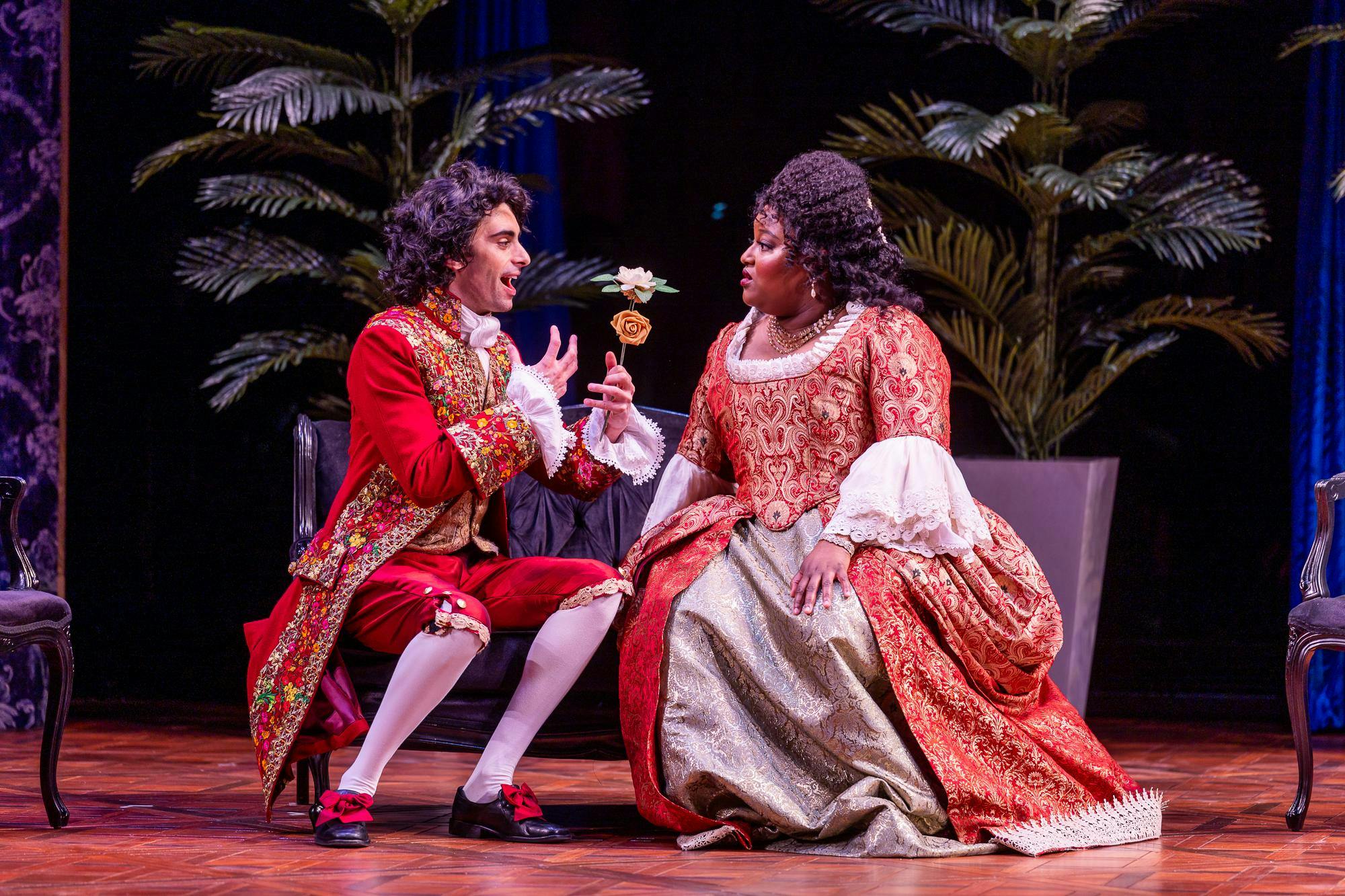The Boston Lyric Opera’s charming production of Chevalier de Saint-Georges’ only surviving opera, “The Anonymous Lover,” ran at the Huntington Theatre from Feb. 16 to 18. “The Anonymous Lover” continued the BLO’s exploration of love through four operas in their 2023-24 season with a Cyrano de Bergerac-esque story. The opera follows the widow Léontine (Brianna J. Robinson), who starts receiving letters from an anonymous admirer. Her secret lover, obscuring his identity out of fear of unreciprocated emotions, is none other than Léontine's close friend, Valcour (Omar Najmi). The story unfolds as a comedic dance of courtship between the two as Valcour covertly persuades Léontine to love again. While the audience watches the leads gradually inch closer to romance, love seems inescapable in the surrounding characters. Jeannette (Ashley Emerson) and Colin (Zhengyi Bai) represent the archetypal doting couple professing the joys of love in a marvelously rendered duet at their wedding. Even the comedic relief duo of Dorothée (Sandra Piques Eddy) and Ophémon (Evan Hughes) find themselves falling for each other throughout the chaotic revelry of courtship that unfolds.
The works of Saint-Georges, arguably the most influential Black composer and violinist in 18th-century France and a contemporary of Mozart, have enjoyed a critical and popular renaissance in the 21st century. Most popularly, the Hollywood film Chevalier (2022) saw the composer make a mark in pop culture. The BLO’s production of “The Anonymous Lover,” which was written in 1780 and stands as one of the first-known operas written by a Black composer, continues this renaissance with a fitting and rousing story for Valentine’s weekend.
In the modern world of the arts, it has been en vogue to mount modern flashy productions of centuries-old stories while maintaining the original text. Baz Luhrmann’s film “Romeo + Juliet” (1996) comes to mind as the most popular example. However, this trend frequents the opera world as well, with Dmitri Tcherniakov’s 2018 direction of “Tristan und Isolde” at the Staatsoper Unter den Linden or Robert Carsen’s 2019 direction of “Giulio Cesare in Egitto” at the Teatro alla Scala in Milan coming to mind as a few of many examples.
The BLO’s rendition of “The Anonymous Lover” flips this trend on its head by maintaining period-piece costumes and set designs while changing the libretto. Playwright Kirsten Greenidge provides a new book adaptation that mixes English dialogue with the original French music. There is no doubt that Greenidge achieved the commendable feat of writing easily comprehensible English for a modern American audience, while still maintaining the feel and emotion of 18th-century dialogue. Nevertheless, the biggest problem with the production rested on the decision to use English.
While aiding comprehension and accessibility, switching from belting arias of abstract declarations and musings on love sung in 18th-century French to modern English for mundane dialogue produced whiplash that undermined the emotional core of the story. Two opposing experiences emerged within the same plot, with each actor seeming to play two different characters. English Valcour and French Valcour felt like two unrelated people. Imagine how dissonant a movie would be if the main character suddenly switched their dialect and accent with no narrative explanation.
Many times a tear-jerking aria or duet would give way to dialogue operating on a separate emotional beat. This is not to say that the English performances were even poor, although they were certainly trumped by the brilliance of the singing — rather, they were not cohesive with the French musical performances to produce a unified narrative whole. Hughes treaded these dissonant narratives best, delivering the best acting of the production with an emotionally consistent character in both French and English that produced much laughter in the audience. However, the heart of the story lies in the budding romance between Valcour and Léontine. As impressive and moving as Valcour's singing was, in the scenes of English dialogue, Najmi did not convince me that his character was in love.
To audience members familiar with her recent work as Julie in “Omar” (2023), it will be no surprise that Brianna Robinson stole the show. While Najmi’s singing proved notable, Robinson took the spotlight from the titular character with her virtuosic and soulful vocal control. In the English scenes, her acting was only second to Hughes, producing a convincing transformation of a woman who learns to accept love once more.
The overall production quality also deserves praise. While the set design and lighting wonderfully recreated 18th-century bourgeois France, Leslie Travers’ costume design must be singled out. Léontine’s gowns, in particular, impressed as regal and notable yet not flashy. The orchestra also impressed with a period-appropriate understated and confident performance guided by the infallible baton of long-time BLO conductor David Angus.
The BLOT provided a weekend of buoyant entertainment and peerless opera singing in the city of Boston to celebrate Valentine’s Day. Even though the production faced issues of narrative emotional resonance, they did not detract from the singular and stunning music that the BLO has given the community once more.






